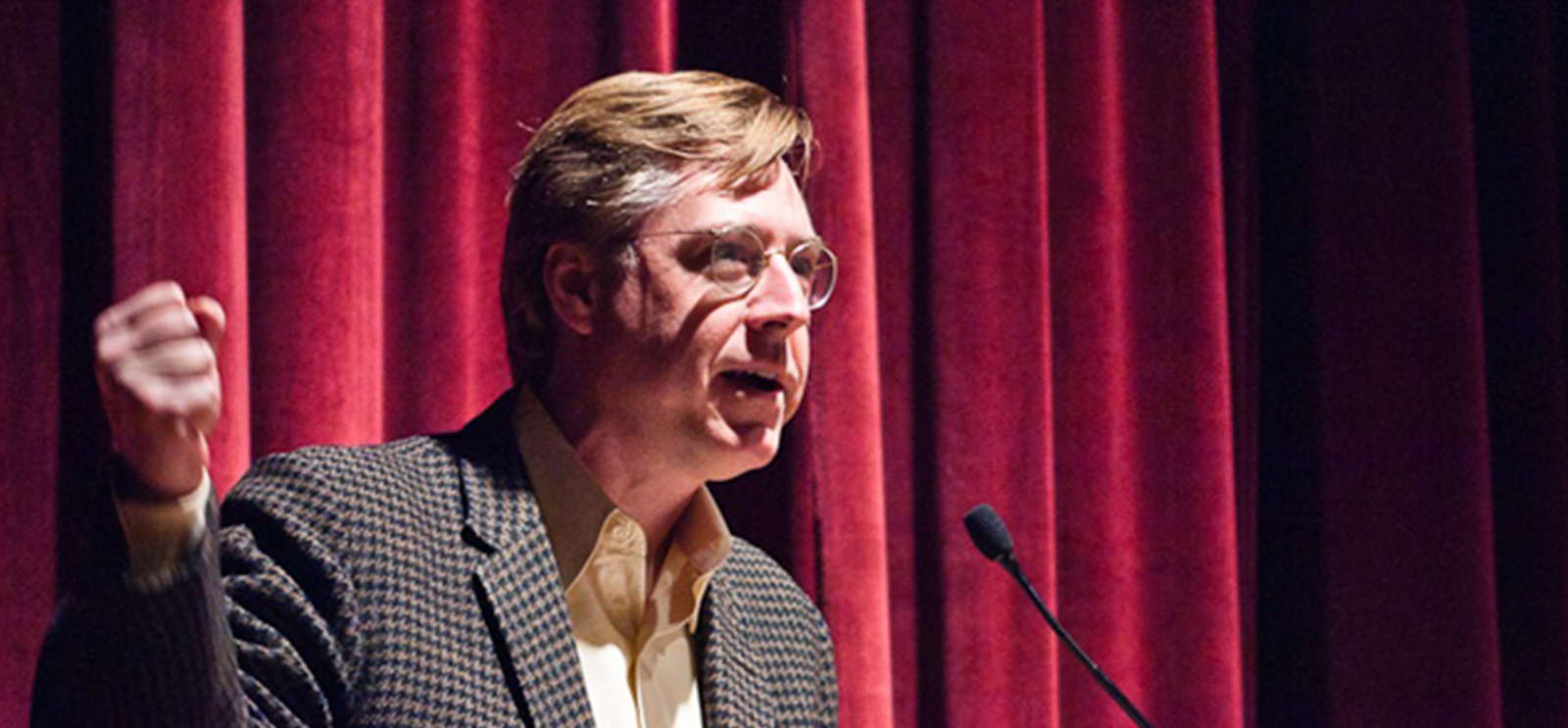
Frank discussion: “The thinking man’s Michael Moore” thinks things look bleak. (Photo by Darren Leow)
Thomas Frank fears the rise of conservative populism could deepen economic decline.
Whenever Thomas Frank, AM’89, PhD’94, gestured in exasperation at the state of American political culture—and he did that a lot during a January talk at International House—water sloshed from the open bottle in his left hand. He didn’t seem to notice the puddle forming next to him on the stage.
Eventually Frank set the water down, but he never let go of the vehemence that spilled it. Reading loose-leaf pages adapted from his new book, Pity the Billionaire: The Hard-Times Swindle and the Unlikely Comeback of the Right (Metropolitan Books, 2012), Frank tossed each completed sheet behind him. By the end he had created a pile of righteous indignation and hissing sarcasm.
A supportive audience of a few dozen challenged him only to serve up more red meat during the question-and-answer session. Called the “thinking person’s Michael Moore” in the New York Times, Frank provided all the ideological snarl expected from the author of the red-state-baiting best seller What’s the Matter with Kansas? (Metropolitan Books, 2004). Now a Harper’s columnist, Frank unloaded on the tea party’s populist fervor in the wake of the financial crisis.
Conservative economic ideas emerged from the recession with rabid public support, much to Frank’s surprise. He traces the financial crisis to the free-market philosophy of “deregulation, de-unionization, privatization, and free-trade agreements” that has had bipartisan political support since the 1980s. “Now, after all this has been going on for decades, we suddenly have a people’s uprising demanding that we embrace the free-market ideology,” said Frank, the founding editor of the left-wing journal The Baffler. “And this only a short while after that same ideology led the world into the greatest economic catastrophe in memory.”
In response, he said, liberals have preached moderation, ceding the rage that sparked legislative reforms during the Great Depression to their political opposition. “The bailouts produced an environment that was perfect for populism in the old Jacksonian tradition, for old-fashioned calamity howlers, for jeremiads raging against the corrupt and the powerful. And one of our two political factions, as we have seen, took to that task immediately and with relish.”
Occupy Wall Street has since added a left-wing perspective to the unrest, but Frank believes the elected officials on that side of the spectrum have been tone deaf. “The actual political descendants of Jackson and Truman and Roosevelt, they pretty much failed to rise to the occasion. They never seemed to get it. ... They could not embrace the requirements of the moment even though responding to hard times was once their movement’s very reason for being.”
In Frank’s view, the unworthy heirs to that tradition include President Obama, who happened to be in Chicago the same night for a series of campaign fundraisers. “Back to raise big bucks,” Frank said, holding up a Chicago Sun-Times clipping that reminded him of a passage from Obama’s book The Audacity of Hope about how money influences politicians.
Major Democratic donors, Frank said, tend to have liberal social views but share the conservative antiunion, pro-free-trade economic philosophy. “In other words, they’re sort of like a nice version of the tea party movement. And that’s who pays for Barack Obama’s campaigns. And he himself has said it, and he’s very honest about it. He says, ‘As I campaigned for the Senate … I found myself becoming more like them.’ And he’s right.”
As indebted as Republicans are to supporters who prospered despite the downturn, Obama and the Democrats do not elude culpability for the Ayn Rand abyss Frank envisions. A triumphant tea party agenda taken to its logical extreme, he said, would eliminate programs such as disaster relief and interstate highways and national parks as government functions for the common good. In their place, Frank argued, would be a culture not of individual responsibility but of social and economic anarchy.
“Every problem that our editorialists fret about today will get worse, of course: inequality, global warming, financial bubbles one after another after another, but it won’t matter,” Frank said. “On our country will go, chasing the only ideology that we have left, down into the seething Arcadia of all against all.”
